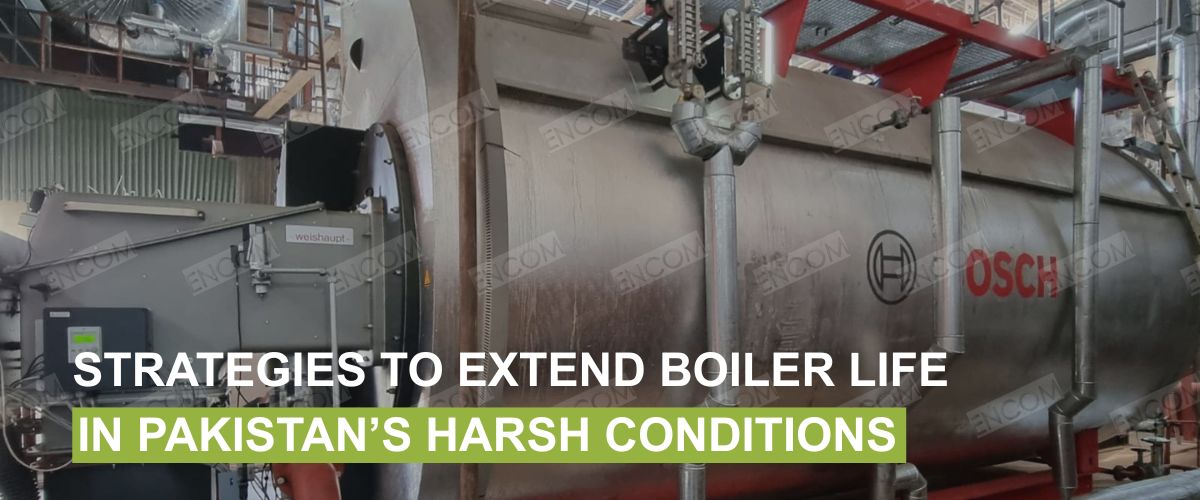What hurts a boiler faster in Pakistan: bad water or bad habits? In our experience, it’s often both. We’ve spent over two decades on plant floors across the country and seen a familiar pattern. Solid equipment commissioned with care, then slowly deprived of the attention it deserves. The result is scale, soot, creeping inefficiency, and eventually an outage that arrives at the worst possible time.
Let’s keep this practical. Here are the strategies we’ve seen extend boiler life, lift efficiency, and prevent costly downtime in Pakistan’s conditions.
Start with Risk, not Routine
Treat the boiler as a system with specific failure modes, not a calendar entry. Reliability-centered maintenance works. Map critical components and use your history of tube leaks, burner trips, and feedwater upsets to set priorities. Even a simple ‘Failure Mode, Effects, and Criticality Analysis’ (FMECA) on the feedwater train or burner management system reveals where attention yields the highest impact. This approach focuses resources and cuts avoidable costs.
Scenario: A process plant tracked repeated ‘Total Dissolved Solids’ (TDS) spikes and foaming events. By adjusting blowdown strategy and dosing based on trend data, steam quality stabilized within weeks and fuel consumption improved.
Run a Tiered Schedule you can Sustain
Consistency beats intensity. Build a schedule that suits your staffing and operating rhythm.
- Daily: Walk the line. Listen for unusual noise or vibration. Check pressure, temperature, and flame stability. Verify softener and chemical dosing. Note any leaks or odors.
- Weekly: Inspect joints, vents, and stack. Clean or replace air filters and clear intakes, especially in dusty environments.
- Monthly: Clean burner assemblies and flue passages. Test safety interlocks and flame sensors. Confirm set-points align with OEM specs.
- Quarterly: Open and clean heat transfer surfaces. Balance system flows. Run combustion efficiency checks and fine-tune.
- Annually: Conduct internal inspections of tubes, Non-Destructive Testing (NDT) where needed, full efficiency testing, and calibration of all safety devices.
Practical win: Plants that never skip monthly burner cleaning avoid the slow drift to excess O2 that quietly drives up fuel bills.
Treat Water like the Asset it is
Pakistan’s water profile makes scale and corrosion persistent threats. Pair softening with alkalinity control and oxygen scavengers. Where TDS or silica is high, reverse osmosis often pays back quickly through lower blowdown and higher efficiency. Monitor hardness, pH, conductivity, and dissolved oxygen. Don’t guess. Log and trend.
If blowdown rates keep rising, find the chemistry drift first instead of opening the valve wider.
Test Safety Systems like Lives Depend on them
It is because they do. Pressure relief valves, low-water cutoffs, and flame safeguards need routine testing and calibration against OEM and regulatory standards. Record every test. Fix root causes, not just symptoms.
Keep Records that tell a Story
Good logs turn noise into insight. Track alarms, trips, fuel flow, blowdown, and water chemistry. Trend data moves you from reactive fixes to predictive actions. It also makes audits smoother.
One-page operator checklists work far better than long manuals. Keep them sharp and current.
Train Operators to see the Early Signals
A trained operator will notice an unstable flame or a sluggish pump before instruments raise alarms. Short toolbox talks and refreshers go a long way. Cover start-up sequences, purge cycles, common trip causes, and safe shutdowns. Rotate responsibilities to spread competence across shifts.
Add Condition Monitoring where it Matters
Start with high-return points. Use thermal imaging on refractory and flanges. Check vibration on feedwater and circulation pumps. Add online conductivity and pH monitoring. Scale up to predictive maintenance as data grows. Early detection reduces unplanned outages and supports the business case for upgrades.
Respect Pakistan’s Environment
Dust, heat, and humidity require tighter discipline. Clean air intakes more often. Protect panels from moisture. In peak summer, watch feedwater temperature and deaerator performance. After heavy rains, re-check insulation, cable glands, and stack integrity.
When to Engage OEM-certified Expertise
Some tasks demand certified teams and genuine parts. Burner tuning, BMS logic verification, relief valve calibration, tube replacement, and comprehensive annual overhauls are best done with OEM-backed methods. In our market, variable fuel quality and ambient stress amplify the value of doing these right.
We’ve built our approach around this reality. ENCOM Pakistan has been the German-backed official partners to industry for over 20 years, with OEM-certified teams and strong partnerships with Bosch, Weishaupt, and others. At ENCOM, we combine local experience with international standards so plants can run reliably and efficiently.
Final Thought
Boilers rarely fail without sending signals. A risk-based plan, disciplined schedules, tight water treatment, vigilant safety testing, and trained eyes will extend life and cut operating costs. If you need a practical review of your maintenance program, support with tuning and inspections, or guidance on upgrades, we’re here to help. Encom Pakistan is the trusted partner for reliable heating, power, and cooling solutions built for Pakistan’s conditions.

